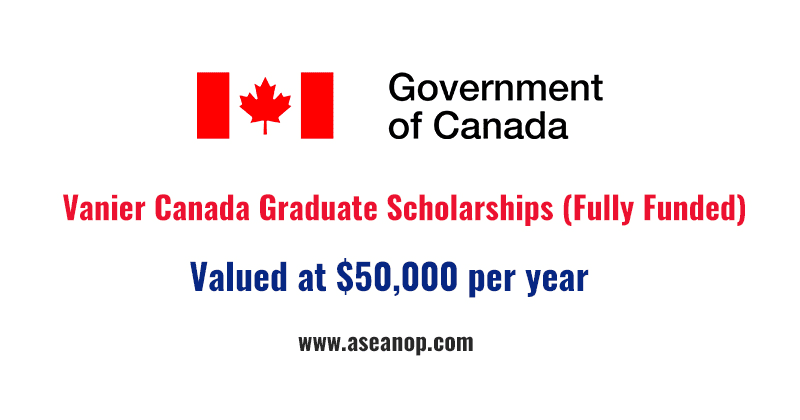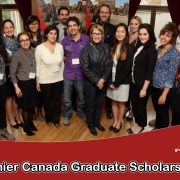Canada Graduate Scholarships: Ph.D. program (2023-2024)
The Canadian Institutes of Health Research (CIHR), the Natural Sciences and Engineering Research Council of Canada (NSERC), and the Social Sciences and Humanities Research Council of Canada (SSHRC) work together to manage the Canada Graduate Scholarships-Doctoral (CGS-D) program. This joint effort aims to support advanced studies and research in Canada.
The CGS-D program is a significant initiative by Canada to help students pursue their doctoral studies. With the combined resources of CIHR, NSERC, and SSHRC, the program covers various fields such as health sciences, natural sciences, engineering, social sciences, and humanities. This means that students from different academic backgrounds can benefit from this program and collaborate with experts from various fields.
To receive these scholarships, students must participate in national competitions organized by SSHRC. These competitions ensure that the scholarships go to deserving and talented doctoral students. Through the CGS-D program, Canada shows its dedication to promoting research, supporting students, and encouraging collaboration across different academic areas.

Canada Graduate Scholarships Summary
| Value | $35,000 per year |
| Duration | 36 months |
| Tenure | Canadian institutions only |
| Application deadline | Through a Canadian institution: Contact your institution Directly to the agencies: October 17 |
| Results announced | April |
| Application forms and instructions | CIHR: ResearchNET and instructions NSERC: Online system and instructions SSHRC: Online system and instructions |
Objectives of Graduate Scholarships
The objectives of graduate scholarships in Canada are multifaceted and aim to achieve several key outcomes:
- Foster Academic Excellence: One primary objective is to recognize and support outstanding graduate students with exceptional academic achievement, research potential, and leadership qualities.
- Promote Research Innovation: These scholarships encourage innovative research across various disciplines by providing financial support and resources. This support enables students to explore new ideas, methodologies, and solutions to complex challenges.
- Retain Top Talent: Canada seeks to retain its brightest minds by offering competitive graduate scholarships, ensuring that talented individuals remain within the country to contribute to its academic and research landscape.
- Enhance Global Competitiveness: By investing in graduate education and research, Canada aims to enhance its global competitiveness in various sectors, fostering collaborations and driving advancements in knowledge and technology.
- Encourage Interdisciplinary Collaboration: Many Canadian graduate scholarships promote interdisciplinary research, fostering collaboration between academic fields. This approach encourages a holistic understanding of complex issues and promotes innovative solutions.
- Support Diversity and Inclusion: Canadian graduate scholarships often prioritize promoting diversity and inclusion, ensuring students from various backgrounds, disciplines, and perspectives have equal opportunities to pursue advanced studies and research.
Description of Canada Graduate Scholarships
Canada Graduate Scholarships (CGS) stand as one of Canada’s premier scholarship programs, aimed at fostering excellence in graduate studies and research within the country. Here’s a comprehensive description highlighting its key aspects:
- Scope and Coverage: The CGS encompasses a range of scholarship opportunities designed for master’s and doctoral students across various academic disciplines, from natural sciences and engineering to social sciences and humanities. These scholarships are awarded based on merit and academic excellence.
- Funding Support: Recipients of the CGS benefit from substantial financial support, which covers tuition fees, research costs, living expenses, and other associated academic expenditures. This funding enables scholars to focus on their research and academic pursuits without financial constraints.
- Merit-Based Selection: The selection process for CGS is highly competitive and merit-based, emphasizing academic achievements, research potential, leadership qualities, and contributions to the academic community. Applicants undergo rigorous evaluations, including academic transcripts, research proposals, letters of recommendation, and interviews, to determine eligibility and suitability.
- Promotion of Research Excellence: A cornerstone of the CGS program is its emphasis on promoting research excellence and innovation. By supporting talented graduate students, the program aims to advance knowledge, drive groundbreaking research, and foster collaboration across disciplines and institutions.
- National and Institutional Collaboration: The CGS program operates through collaborative efforts between various Canadian federal granting agencies, including the Natural Sciences and Engineering Research Council of Canada (NSERC), the Social Sciences and Humanities Research Council of Canada (SSHRC), and the Canadian Institutes of Health Research (CIHR). Individual universities and research institutions are also pivotal in facilitating and administering these scholarships.
- Diverse Opportunities: The CGS program offers many opportunities tailored to meet graduate students’ unique needs and aspirations at different stages of their academic journey. Whether pursuing a master’s degree or a doctoral program, students can explore various scholarship avenues, each with specific eligibility criteria, funding provisions, and research focus areas.

Eligibility of Canada Graduate Scholarships
If you want to apply, you must:
1-Be a Canadian citizen, a Canadian permanent resident, or a Protected Person as of the application deadline as defined in section 95(2) of the Immigration and Refugee Protection Act (Canada).
2-If you were previously enrolled in a graduate program, you must have finished no more than 24 months of full-time study in your doctoral program by December 31 of the calendar year of application.
3-If enrolled in a joint program, such as an MD/Ph.D. or MA/Ph.D., have completed no more than 36 months of full-time study there by December 31 of the calendar year of application. Whether or not you had previously been enrolled in a master’s program, if you fit this description, you have access to the 36-month window.
4-If applying after enrolling straight from a bachelor’s to a Ph.D. program, you must have finished no more than 36 months of full-time study in your doctoral program by December 31 of the calendar year of application (without having completed or enrolled in another graduate program). At the time of application, direct-entry candidates must be enrolled in their doctoral program.
Note: You might be eligible to apply to the CGS M program for your first year of doctoral funding in order to extend your funding period as much as possible. You are in charge of deciding what kind of award you apply for. For more details, see the list of other restrictions below.
By December 31 of the calendar year of application, you must have completed at least 12 months of full-time study toward the degree for which you are asking for funding, including summer sessions. One term of full-time study equals two terms of part-time study.
Fast-track and joint programs
The months of study completed are determined starting from the date that you transferred into the doctoral program if you were enrolled in a master’s program and later transferred to a doctoral program (fast track).
The months of study are calculated starting from the date you are formally registered in the joint program (including the master’s portion of the program) if you are enrolled in a joint program and a master’s degree is obtained as part of the program (for example, MA/Ph.D.).
Program of study for Canada Graduate Scholarships
As a condition of graduation from an eligible doctoral program, there must be a sizable research component that results in the completion of a thesis, major research project, dissertation, academic publication, performance, recital, and/or exhibit that has been merit- or expert-reviewed at the institutional level.
If a significant autonomous research component meets the criteria outlined above, joint programs leading to a professional degree (such as MD/Ph.D., DVM/Ph.D., JD/Ph.D., MBA/Ph.D., and clinical psychology) as well as clinically oriented programs of study are eligible.
Application Process of Canada Graduate Scholarships
To ensure that it is reviewed by professionals in disciplines most closely related to your field(s) of study, you should fill out the agency application that is most aligned with your research topic. Refer to Choosing the proper federal grant agency for more details.
Consult the instructions and application website for the relevant agency to finish the application process.
CIHR: ResearchNET and instructions
NSERC: Online system and instructions
SSHRC: Online system and instructions
Applications that are incomplete will be disqualified from the competition.
Where to submit an application for Canada Graduate Scholarships
Depending on your registration status at the application deadline and/or your registration status during the application year, you must submit an application either through a Canadian institution or directly to the relevant agency. Your application will be rejected if it is not submitted through the appropriate route.
You must determine the proper channel in order to:
- Find out if a facility has a quota* for the agency you’ve chosen.
- Consult the graph and documentation in the document. What location should I use for my application?
*The number of applications that an institution may submit to each agency’s national competition is referred to as the “quota.” Institutions are given unique quotas by every agency (CIHR, NSERC, and SSHRC).
Application deadlines for Canada Graduate Scholarships
Institution deadlines
If you are applying through an institution, you must do so by the institution’s deadline, which might be much earlier than the agency deadline. You should get in touch with your graduate studies faculty if you want to learn more about institutional deadlines (or their equivalent).
Agency deadlines
If you are qualified to apply directly to one of the agencies, you must do so by 8:00 p.m. (ET) on October 17 using the agency’s application portal (see “Where Should I Submit My Application?” for more information). Applications may be submitted up until 8:00 p.m. on the following business day if the deadline falls on a weekend (ET). Applications that are incomplete will be rejected.
Selection process for Canada Graduate Scholarships
Institutional review
Each Canadian institution’s faculty of graduate studies (or its equivalent) is in charge of organizing the institutional review of CGS D applications. Institutions then submit applications to each agency for review in accordance with their quotas.

Agency review
Applications are examined by agency selection committees (whether sent directly to the agencies or via the institutions).
Indigenous applicants
Beyond their application quota, institutions may suggest applications from self-identified Indigenous applicants for the doctoral awards competition. Indigenous applicants must check the appropriate box on the application form indicating that they consent to the use of their personal information for this purpose.
Selection criteria for Canada Graduate Scholarships
The following factors form the basis of how institutions and agencies evaluate CGS D applications:
| Selection criteria | Description | Weight |
| Research ability and potential | Indicators of research ability and potential: 1-quality of research proposal: specific, focused, and feasible research question(s) and objective(s) clear description of the proposed methodology significance and expected contributions to research 2-relevant training, such as academic training, lived experience, and traditional teachings 3-research experience and achievements relative to the applicant’s stage of study, lived experience, and knowledge systems 4-quality of contributions and extent to which they advance the field of research—contributions may include publications, patents, reports, posters, abstracts, monographs, presentations, creative outputs, knowledge translation outputs, community products, etc. 5-demonstration of sound judgment and ability to think critically 6-demonstration of responsible and ethical research conduct, including honest and thoughtful inquiry, rigorous analysis, commitment to safety and to the dissemination of research results, and adherence to the use of professional standards 7-enthusiasm for research, originality, initiative, autonomy, relevant community involvement, and outreach 8-ability or potential to communicate theoretical, technical and/or scientific concepts clearly and logically in written and oral formats | 50% |
| Relevant experience and achievements obtained within and beyond academia | Indicators of relevant experience and achievements obtained within and beyond academia: 9-scholarships, awards and distinctions (amount, duration and prestige) 10-academic record transcripts duration of previous studies program requirements and courses pursued course load relative standing in program (if available) 11-professional, academic and extracurricular activities as well as collaborations with supervisors, colleagues, peers, students and members of the community, such as teaching, mentoring, supervising and/or coaching managing projects participating in science and/or research promotion participating in community outreach, volunteer work and/or civic engagement chairing committees and/or organizing conferences and meetings participating in departmental or institutional organizations, associations, societies and/or clubs |
Notification of results for Canada Graduate Scholarships
Results will be communicated to applicants by April 30 who submitted applications to the agencies, whether directly or through their institution.
The organizations will post the names of scholarship winners—along with other essential award details—on their individual websites.
Conditions of the award for Canada Graduate Scholarships
The policies and rules outlined in the Tri-agency research training award holder’s guide and in any other documents about scholarship applications and awards must be followed by applicants and award holders.
The agencies reserve the right to apply the rules and regulations outlined in their published materials to their funding opportunities.
Award recipients may be allowed to use their awards on a part-time basis. For more details, consult the Tri-agency research training award holder’s guide.
Official languages of Canada Graduate Scholarships
The official language of the applicant’s choice may be used for the application submission. Institutions must have procedures in place to evaluate applications submitted in both English and French.
Frequently Asked Questions: Canada Graduate Scholarships
For more information on this program, get in touch with any of Canada’s three grant-making organizations. You ought to get in touch with the organization whose mission aligns with your area of study.
Within 48 hours, the agencies hope to respond to questions. Response times might be slowed down from November to January, which is peak times.
to CIHR, contact cgsma-bescbm@cihr-irsc.gc.ca
to NSERC, contact schol@nserc-crsng.gc.ca
to SSHRC, contact fellowships@sshrc-crsh.gc.ca
1-Canada Graduate Scholarships – Michael Smith Foreign Study Supplements
2-Department of National Defence Mobilizing Insights in Defence and Security (MINDS) Scholarship Initiative
3- Indigenous Scholars Awards and Supplements Pilot Initiative
1-Academic excellence
2-Research potential
3-Personal characteristics and interpersonal skills
Awards will be made available in the Research Portal beginning on April 1. Clicking this link will take you to a different website. Up until January 31 of the following year, substitute offers are acceptable. You are in charge of regularly checking the Research Portal between April 1 and January 31 for competition results. For additional details regarding the notification of outcomes, see the instructions for completing an application.








Leave a Reply
Want to join the discussion?Feel free to contribute!